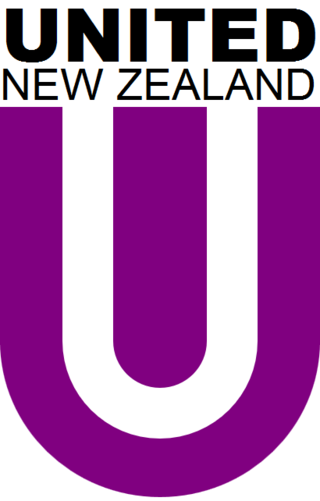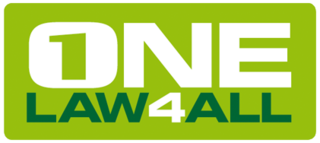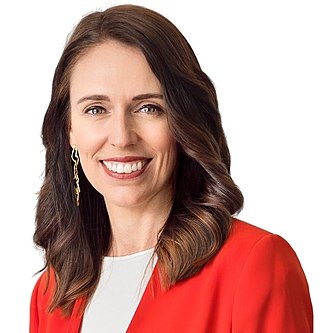An editor has nominated this article for deletion. You are welcome to participate in the deletion discussion , which will decide whether or not to retain it. |
GOdsownNZ was an unregistered political party in New Zealand. The party was Christian and socially conservative and described itself as "non-P.C.", but denied being "right wing" or "anti-refugee". [1] It was founded in April 2017 by former Conservative Party of New Zealand board member Claire Holley. [2] [3] It promised to be a "less watered-down" version of the Conservative Party. [4]
The party initially planned to register, and applied for and was granted a broadcasting allocation in order to contest the 2017 election. [5] In July 2017 it announced that it did not have sufficient members for registration, but that Holley would contest the West Coast-Tasman electorate. [6] Holley had previously stood for this electorate, for the Conservative Party, in 2011 and 2014. Holley received 72 electorate votes in 2017, coming 8th out of 10 candidates.
New Zealand First, commonly abbreviated to NZ First or NZF, is a political party in New Zealand, founded and led by Winston Peters, who has served three times as deputy prime minister. The party has formed coalition governments with both major political parties in New Zealand: with the New Zealand National Party from 1996 to 1998 and 2023 to present, and with the New Zealand Labour Party from 2005 to 2008 and 2017 to 2020. New Zealand First currently serves in a coalition government with both National and ACT New Zealand as part of the Sixth National government, having won 6.08% of the total party vote in the 2023 New Zealand general election.
United Future New Zealand, usually known as United Future, was a centrist political party in New Zealand. The party was in government between 2005 and 2017, first alongside Labour (2005–2008) and then supporting National (2008–2017).

United New Zealand was a centrist political party in New Zealand founded in 1995. It merged with the Christian-based Future New Zealand party to form the United Future New Zealand party in 2000.

Destiny New Zealand was a Christian political party in New Zealand centred on the charismatic/pentecostal Destiny Church. The party described itself as "centre-right". It placed a strong focus on socially conservative values and argued that the breakdown of the traditional family was a primary cause of many of New Zealand's problems. It announced its de-registration as a political party on 18 September 2007, and was removed from the register a month later. It did not hold any seats in Parliament.
Te Pāti Māori, also known as the Māori Party, is a political party in New Zealand advocating Māori rights. With the exception of a handful of general electorates, Te Pāti Māori contests the reserved Māori electorates, in which its main rival is the Labour Party.
The Kiwi Party was a political party operating in New Zealand between 2007 and 2011. Briefly known as Future New Zealand, it was a breakaway from the United Future New Zealand party and sought to carry on the tradition of Future New Zealand. The party was formed when MP Gordon Copeland left United Future after a dispute over support for the Crimes Amendment Act 2007. At the 2008 general election, the Kiwi Party was unsuccessful, and was not re-elected to Parliament. It did not contest the 2011 general election under its own banner, but the leaders and other members stood for the Conservative Party.

The 2014 New Zealand general election took place on Saturday 20 September 2014 to determine the membership of the 51st New Zealand Parliament.
The Mana Movement, originally known as the Mana Party, is a former political party in New Zealand. The party was led by Hone Harawira who formed it in April 2011 following his resignation from the Māori Party. Harawira won the by-election in Te Tai Tokerau of 25 June 2011 for the Mana Party and retained the seat during the 2011 general election in November.

New Conservatives is a conservative political party in New Zealand. Some opponents and observers have described the party's policies as far-right, though the party now states it has moved to a "more centrist" position under new leadership. It advocates for lower taxation, anti-abortion measures and austerity cuts.

1Law4All was a registered political party in New Zealand. The party was launched in June 2013 and was temporarily led by Tom Johnson. The party supported removing references to the Treaty of Waitangi from legislation, abolition of the Waitangi Tribunal and Māori electorates, repeal of the Marine and Coastal Area Act 2011, and withdrawal of New Zealand from the UN Declaration on the Rights of Indigenous Peoples. The party never contested an election and was deregistered in May 2015.

The Internet Party was a registered political party in New Zealand that promoted Internet freedom and privacy. The party was founded in January 2014 with the financial support and promotion of internet entrepreneur Kim Dotcom, and was first led by former Alliance MP Laila Harré, then by citizen journalist Suzie Dawson.
The Expatriate Party of New Zealand was an unregistered political party that sought to represent people who consider themselves New Zealanders but who do not reside in New Zealand. It contested one electorate, but not the party vote, at the 2014 general election.
The New Zealand Outdoors & Freedom Party, formerly the New Zealand Outdoors Party, is a registered political party in New Zealand. It is part of the Freedoms NZ umbrella movement. The party is co-led by Sue Grey and Donna Pokere-Phillips.

The 2020 New Zealand general election was held on Saturday 17 October 2020 to determine the composition of the 53rd New Zealand Parliament. Voters elected 120 members to the House of Representatives, 72 from single-member electorates and 48 from closed party lists. Two referendums, one on the personal use of cannabis and one on euthanasia, were also held on the same day. Official results of the election and referendums were released on 6 November.

Vision NZ is a nationalist political party in New Zealand led by Hannah Tamaki, the co-leader of the fundamentalist Christian movement Destiny Church. Its policies have included opposition to abortion, homosexuality, immigration, and the construction of new mosques. It has supported creating a Māori-owned bank and Tūhoe ownership of Te Urewera, and has called for government funding for Destiny Church programmes.

The Sustainable New Zealand Party, also called Sustainable NZ, was a political party in New Zealand. An environmentalist party, it had a focus on water, native species, and sustainable economic growth. It contrasted itself with the larger Green Party by claiming to not be aligned with either side of the political aisle and being prepared to work with either the National Party or the Labour Party.
NewZeal is a socially conservative political party in New Zealand, currently led by Alfred Ngaro.
The New Zealand TEA Party was a registered political party in New Zealand. The party was led by John Hong. The party contested the 2020 general election, but did not win any seats.
Heartland New Zealand is a New Zealand political party founded in 2020. The party is rural-based, and opposed the New Zealand Emissions Trading Scheme, the Paris Agreement, and attempts to limit the environmental impacts of agriculture.